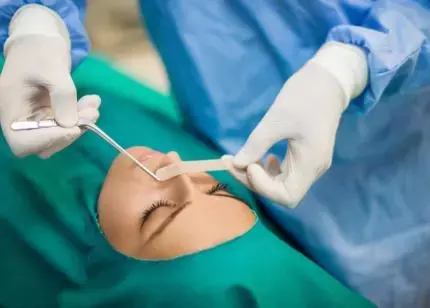- Home
- Medical news & Guidelines
- Anesthesiology
- Cardiology and CTVS
- Critical Care
- Dentistry
- Dermatology
- Diabetes and Endocrinology
- ENT
- Gastroenterology
- Medicine
- Nephrology
- Neurology
- Obstretics-Gynaecology
- Oncology
- Ophthalmology
- Orthopaedics
- Pediatrics-Neonatology
- Psychiatry
- Pulmonology
- Radiology
- Surgery
- Urology
- Laboratory Medicine
- Diet
- Nursing
- Paramedical
- Physiotherapy
- Health news
- Fact Check
- Bone Health Fact Check
- Brain Health Fact Check
- Cancer Related Fact Check
- Child Care Fact Check
- Dental and oral health fact check
- Diabetes and metabolic health fact check
- Diet and Nutrition Fact Check
- Eye and ENT Care Fact Check
- Fitness fact check
- Gut health fact check
- Heart health fact check
- Kidney health fact check
- Medical education fact check
- Men's health fact check
- Respiratory fact check
- Skin and hair care fact check
- Vaccine and Immunization fact check
- Women's health fact check
- AYUSH
- State News
- Andaman and Nicobar Islands
- Andhra Pradesh
- Arunachal Pradesh
- Assam
- Bihar
- Chandigarh
- Chattisgarh
- Dadra and Nagar Haveli
- Daman and Diu
- Delhi
- Goa
- Gujarat
- Haryana
- Himachal Pradesh
- Jammu & Kashmir
- Jharkhand
- Karnataka
- Kerala
- Ladakh
- Lakshadweep
- Madhya Pradesh
- Maharashtra
- Manipur
- Meghalaya
- Mizoram
- Nagaland
- Odisha
- Puducherry
- Punjab
- Rajasthan
- Sikkim
- Tamil Nadu
- Telangana
- Tripura
- Uttar Pradesh
- Uttrakhand
- West Bengal
- Medical Education
- Industry
Transeptal suturing has lesser effect on swallowing than other techniques postoperatively

A recent research report has indicated that transeptal suturing has a lesser effect on swallowing than other techniques and also more comfortable than the other techniques in the postoperative period.
Findings have been published in European Archives of Oto-Rhino-Laryngology.
Septal deviation is one of the most frequently observed diseases in otolaryngology and can cause congestion, difficulty breathing, headache, and rhinosinusitis. Septoplasty is frequently performed in patients with nasal obstruction. This produces a change in the nasal respiratory airflow, which many patients experience as an improvement. The goal of the operation is to eliminate the symptoms associated with nasal congestion without negatively affecting the physiology of the nose. Packing is used after septoplasty to control postoperative bleeding, fix the cartilage, and prevent synechia and septal hematoma. However, nasal packing also increases the risks of infection, pain, and nasal obstruction and may affect the mucociliary activity and olfactory function. Currently, transseptal suturing is being adopted to achieve septal stabilization in place of nasal packing.
This clinical trial aimed to investigate the effects of different nasal packing methods and transseptal suture technique on swallowing after septoplasty.
The current randomized prospective study consists of 180 consecutive patients with septal deviation. All the patients underwent septoplasty. All the patients were randomly assigned to three groups. In group A, transseptal sutures were used for septal stabilization. In group B, both nasal passages were packed with Merocel tampons for septal stabilization. In group C, both nasal passages were packed with Doyle silicone splints for septal stabilization. For the evaluation of swallowing, the Eating Assessment Tool (EAT-10) questionnaire and a visual analog scale (VAS) were administered to all the patients preoperatively and on the second and seventh postoperative days.
Data analysis revealed the following facts.
- One hundred and twenty two of the patients (67.7%) were female and 58 of them (32.2%) were male.
- The mean age was 32.41 ± 12.37 years (range: 18–57 years). Both EAT-10 and VAS scores on the second postoperative day were significantly higher than the preoperative scores in all the groups (p < 0.05).
- The transseptal suture group had significantly lower EAT-10 and VAS scores on the second postoperative day than the Merocel packing and silicone packing groups (p < 0.05).
- Both EAT-10 and VAS scores on the postop 7th day significantly decreased in all groups compared to the postop second day (p < 0.05).
Researchers concluded that Septoplasty affects swallowing, regardless of whether a tampon is applied. Transeptal suturing has a lesser effect on swallowing than other techniques. Although silicone packing is a less invasive method, it negatively affects swallowing, similar to Merocel packing. The transseptal suture technique is more comfortable than the other techniques in terms of swallowing function in the postoperative period.
For full article follow the link: https://doi.org/10.1007/s00405-021-06854-x
Primary source: European Archives of Oto-Rhino-Laryngology
Dr Satabdi Saha (BDS, MDS) is a practicing pediatric dentist with a keen interest in new medical researches and updates. She has completed her BDS from North Bengal Dental College ,Darjeeling. Then she went on to secure an ALL INDIA NEET PG rank and completed her MDS from the first dental college in the country – Dr R. Ahmed Dental College and Hospital. She is currently attached to The Marwari Relief Society Hospital as a consultant along with private practice of 2 years. She has published scientific papers in national and international journals. Her strong passion of sharing knowledge with the medical fraternity has motivated her to be a part of Medical Dialogues.
Dr Kamal Kant Kohli-MBBS, DTCD- a chest specialist with more than 30 years of practice and a flair for writing clinical articles, Dr Kamal Kant Kohli joined Medical Dialogues as a Chief Editor of Medical News. Besides writing articles, as an editor, he proofreads and verifies all the medical content published on Medical Dialogues including those coming from journals, studies,medical conferences,guidelines etc. Email: drkohli@medicaldialogues.in. Contact no. 011-43720751


